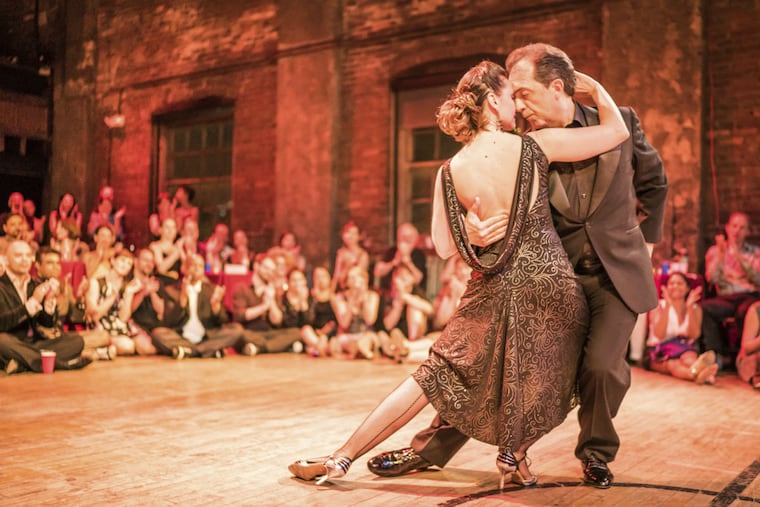At this festival, it takes everybody to tango
They call it a "tango trance." It's the meditative state, like a runner's high, when tango dancers are listening to the music, improvising in sync with their partners, and feeling the energy of other dancers in the room.

They call it a "tango trance."
It's the meditative state, like a runner's high, when tango dancers are listening to the music, improvising in sync with their partners, and feeling the energy of other dancers in the room.
"Argentine tango is improvised beyond the level that almost any dance is improvised," said Meredith Klein, director of the Philadelphia International Tango Festival, to be held this weekend at Christ Church Neighborhood House. Events include lessons, workshops, and performances, going into the wee hours of the morning. Some of the biggest names in tango will be teaching.
In tango, "every single movement is communicated from the leader to the follower," who must decipher the next step from countless possible combinations," said Klein, who also directs the Philadelphia Argentine Tango School in Fishtown and who is one of the festival teachers.
"Dancers move counterclockwise around the room, like on lanes in a racetrack," Klein said. "Everybody around the room is hearing the music in a similar way." The music can also offer hints of which steps to dance, for example, "move onward, stop, and turn in place. When things are really working, there's a kind of chemistry around the whole dance floor.
"That's what the festival offers above any other tango class. When you get this many people together dancing for this many hours at this level of inspiration, it makes people want to travel to dance. It keeps people dancing after they can't feel their feet anymore."
Never danced? There's a beginner track, and you can pay at the door.
Now in its sixth year, the Philadelphia International Tango Festival is expected to attract 500 to 700 dancers from all over the United States, England, the British West Indies, and Austria.
Of the eight teachers, Klein is the only one not from Buenos Aires, where the dance began. She grew up in Narberth, went to Episcopal Academy, and then to Amherst College in Massachusetts, where she discovered tango. From there, she moved to Boston and then to Buenos Aires for three years. In her first week in Argentina, she met her dance partner, Andrés Amarilla, with whom she founded the Philadelphia Argentine Tango School.
After living in Argentina, Klein and Amarilla wanted to bring their art back to the United States. Some cities already had larger tango communities, so Klein turned her eye back to her hometown, where now there are several tango schools.
Klein teaches, organizes tango tours, and with Amarilla performs and leads workshops around the world. She estimates they have toured 75 cities. Both will teach at the festival.
Tango began as an urban dance in Buenos Aires, but it lost traction when rock 'n' roll came to town. It slid even further into obscurity during the 1976-83 military dictatorship in Argentina, when cultural expression was repressed.
Gustavo Naveira kept tango alive during that time and helped bring it back to the Argentine culture.
"He is an encyclopedia of tango history," Klein said, crediting him "single-handedly for the resurge in interest in tango."
Naveira will teach and perform at the Philadelphia festival, along with his partner, Giselle Anne, who performed in many famous tango shows all over the world and started a school and several other tango organizations. Gustavo and Giselle have been dancing together since 1995 and teaching tango seminars since 2003.
Alejandro Larenas and Marisol Morales, also teaching at the festival, have danced together since 2005 and made 15 tours around the world to perform and teach. Other teachers include Inés Muzzopappa, who has been dancing tango since childhood, and Marcelo "El Chino" Gutierrez, who has spent 10 years perfecting his tango teaching system.
The festival includes classes, seminars, and 26 hours just for dancing Thursday through Sunday. Altogether, there are about 40 hours of events, going to 2 a.m. every day. Performances begin every night at 10:30 or 11, featuring the teaching staff and a 10th anniversary performance from the spoof dance company Tango Cheeseballs.
On Saturday night, "if they can survive," Klein says, there's an after party at her studio in Fishtown, with more dancing until 6 a.m.
"People suffer a lot the next day," she says, "but it's worth it."
@edunkel